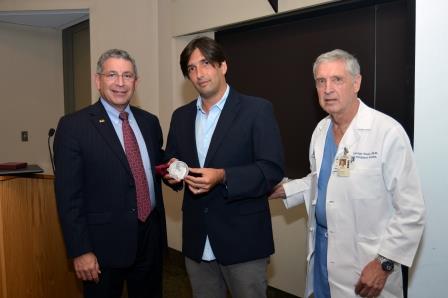Mauro Costa-Mattioli, Ph.D.
Assistant Professor
Department of Neuroscience
Department of Molecular and Cellular Biology
Program in Developmental Biology

Dr. Costa-Mattioli was nominated for his important work on the molecular and cellular mechanisms of learning and memory. His pioneering findings on the role of the virus-sensing kinase PKR in long-term synaptic plasticity, brain rhythmicity, and memory formation through regulation of synthesis of the immune factor IFN-? supported a paradigm shift in which immune molecules control brain rhythmicity and cognitive processes in the adult brain. Other work showed that mRNA translation, and not exclusively transcription, plays a crucial role in protein synthesis which is essential to memory formation processes. His most recent work, on which his nomination was based, linked molecular signaling pathways to the structural changes that contribute to the long-term neural changes underlying memory storage.
Dr. Costa-Mattioli’s nomination papers for the Michael E. DeBakey, M.D. Excellence
in Research Award included:
Zhu PJ, Huang W, Kalikulov D, Yoo JW, Placzek A, Stoica L, Zhou H, Bell JC, Friedlander
MJ, Krnjevic K, Noebels JL, Costa-Mattioli M (2011). "
“Suppression of PKR promotes network excitability and enhanced cognition by interferon-?-mediated
disinhibition”. ". Cell , 147:1384-96.
Stoica L, Zhu PJ, Huang W, Zhou H, Kozma SC, and Costa-Mattioli M (2011) “Selective
pharmacogenetic inhibition of mTORC1 blocks long-term synaptic plasticity, memory
consolidation and reconsolidation "
Selective pharmacogenetic inhibition of mTORC1 blocks long-term synaptic plasticity,
memory consolidation and reconsolidation ". ”. Proceeding National Academy of
Science USA 108:3791-3796.
Huang W, Zhu PJ, Zhang S, Zhou H, Stoica L, Galiano M, Krnjevic K, Roman G, Costa-Mattioli
M (2013) " mTORC2
controls actin polymerization required for consolidation of long-term memory
". Nat Neurosci 16(4)441-8.
